There are radicals within radicals challenging the fight that India’s queer are waging against the establishment for equal marriage rights
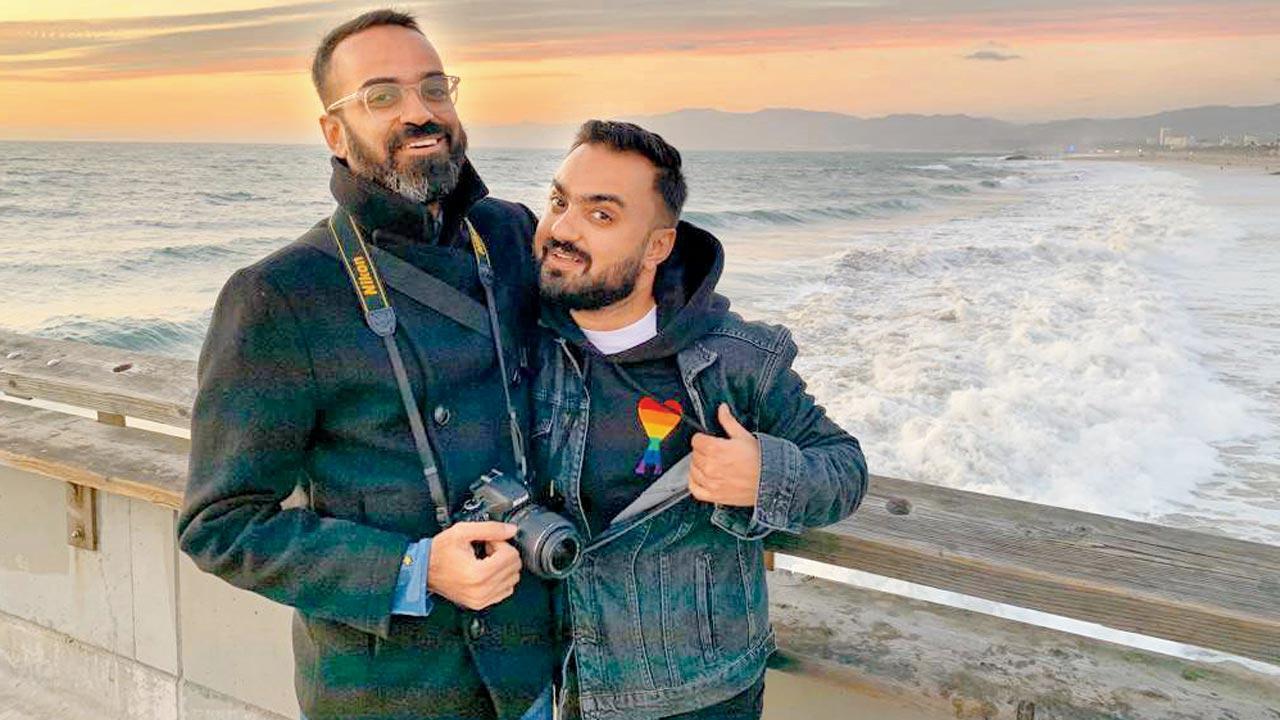
Partners Ashish Mehta and Akshay Tyagi say they will be ecstatic if the court were to rule in favour of same-sex marriage in India, “but our solidarity [with the queer community] does not end at one sanction. There is more to be done for a fairer society [to exist]; our battle is constant.”
If the 2018 Supreme Court (SC) ruling that decriminalised homosexuality was a “rainbow of hope”, the momentum for legal status of same-sex marriage in India could usher in greater acceptance for the queer.
ADVERTISEMENT
When someone asks Akshay Tyagi and his partner Ashish Mehta, when they will marry, they find themselves tongue tied. “It is the strangest thing because it is our straight, married friends who are curious to know,” Tyagi laughs. It is not like the 36-year-olds are not in love. They have been a couple for five-and-a-half years, but they wonder what marriage specifically will bring for them. “We are out and proud. In all senses, we are already married; my parents and friends know Ashish as my partner, not flatmate. We like to think we are living human experiences rather than institutional ones,” Tyagi argues, adding that they have also decided not to have children.
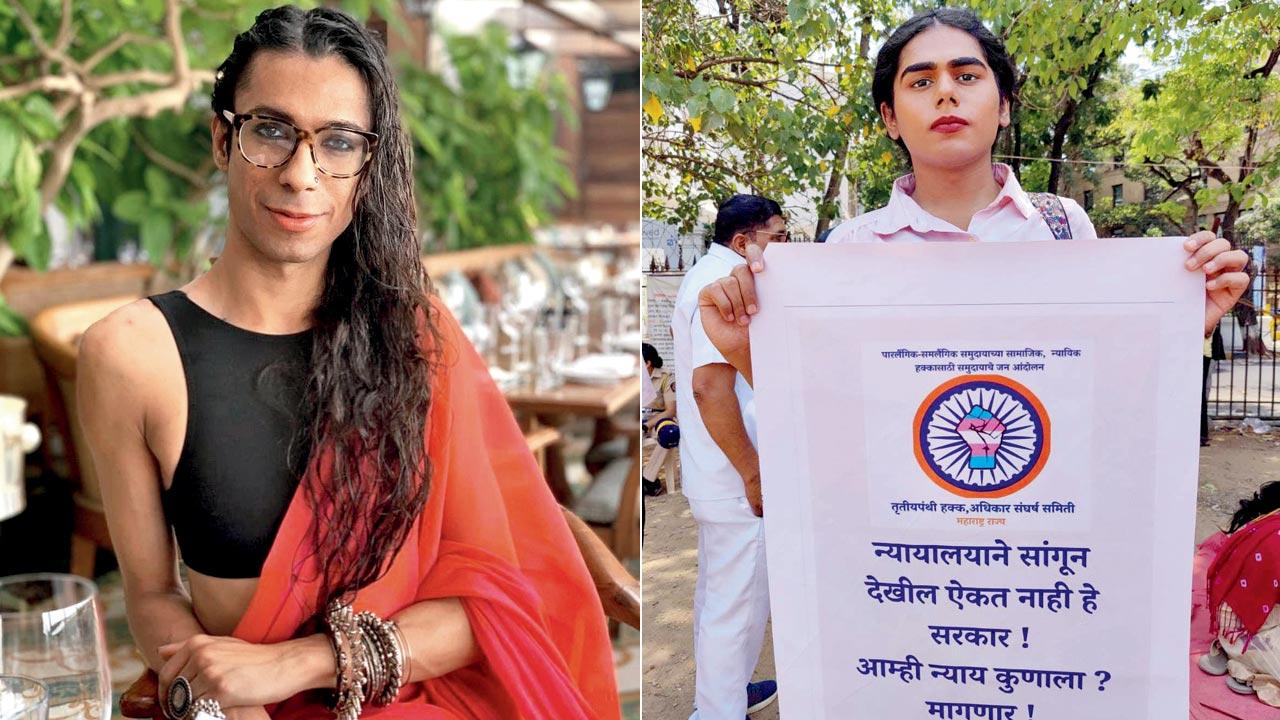 Vikramaditya Sahai, teacher and researcher at Centre for Law and Policy Research, wonders whether an institution that divides can assimilate the queer into the mainstream; (right) Pune-based Rie Raut is a non-gender conforming trans femme fighting for horizontal reservations for transgender people
Vikramaditya Sahai, teacher and researcher at Centre for Law and Policy Research, wonders whether an institution that divides can assimilate the queer into the mainstream; (right) Pune-based Rie Raut is a non-gender conforming trans femme fighting for horizontal reservations for transgender people
This, of course, doesn’t mean that the two won’t whoop with joy if the SC, which is currently hearing a group of petitioners arguing to allow same-sex marriage in India, decides to rule in the favour of their community. “We will be overjoyed,” Tyagi asserts, “but our solidarity [with the queer community] does not end at one sanction. There is more to be done for a fairer society [to exist]; our battle is constant.”
Mehta is not against same-sex marriage; he is sceptical of marriage in general. He says it puts immense social pressure on individuals in hidden ways. “Marriage enforces a rigid point of view; I don’t see anything free about it. It is little more than a social sanction designed for external validation,” says the former lawyer and now full-time writer. Mehta and Tyagi oppose marriage then for the same reason that the feminist movement did; it is a conservative institution that works to preserve status quo, and the dominance of patriarchy.
![Minakshi Sanyal, who co-founded a queer rights/justice-based NGO with Akanksha, her partner of 30 years, is among the 20 petitioners in the marriage equality case in the Indian Supreme Court. She says, “At age 60, I would probably not [marry]. It is a complicated proposition.”](https://images.mid-day.com/images/images/2023/may/gay-may-seven-b_e.jpg) Minakshi Sanyal, who co-founded a queer rights/justice-based NGO with Akanksha, her partner of 30 years, is among the 20 petitioners in the marriage equality case in the Indian Supreme Court. She says, “At age 60, I would probably not [marry]. It is a complicated proposition.”
Minakshi Sanyal, who co-founded a queer rights/justice-based NGO with Akanksha, her partner of 30 years, is among the 20 petitioners in the marriage equality case in the Indian Supreme Court. She says, “At age 60, I would probably not [marry]. It is a complicated proposition.”
The couple is not alone. Even as India’s queer and their allies look with hope towards the apex court to grant equal marriage rights by amending the Special Marriage Act, a small group has joined in but unsure whether they will exercise their right to marry personally. And their decision to have-and-to-hold but not necessarily marry is personal and complex.
Vikramaditya Sahai, 35, teacher and researcher at the Centre for Law and Policy Research, wonders whether an institution that divides — by offering privileges and recognition to those who comply, and othering those who don’t, including single individuals and the “marginalised” societies — can help assimilate the queer into the mainstream. “Devadasis, for example, could not marry. Women who are sexually abused find it tough to find partners, and single women face social and emotional pressure to fall in line,” they explain.
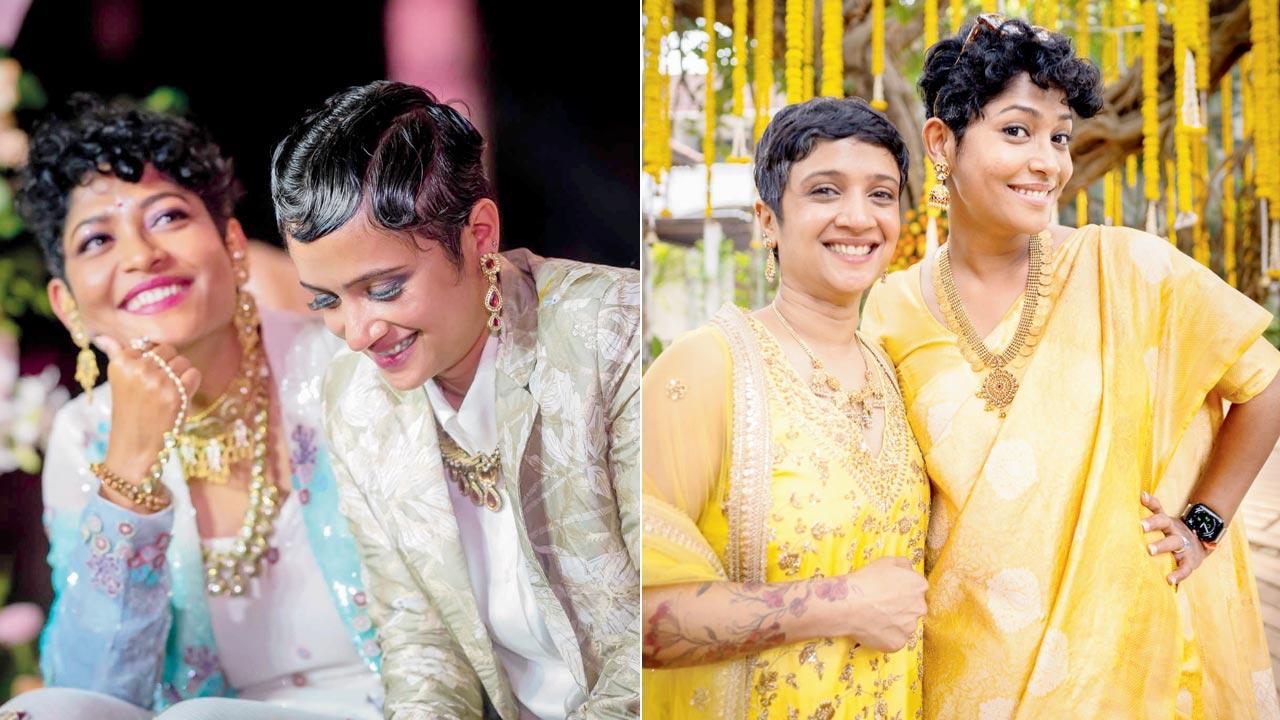 Anuja Parikh and Rupa Sengupta “wed” in an intimate ceremony in Mumbai last December with friends and family in attendance. They did away with patriarchal wedding rituals like the kanyadan and took turns to dress in both feminine and masculine fashion
Anuja Parikh and Rupa Sengupta “wed” in an intimate ceremony in Mumbai last December with friends and family in attendance. They did away with patriarchal wedding rituals like the kanyadan and took turns to dress in both feminine and masculine fashion
Sahai (they/them) challenges the notion that if gay and lesbian couples are allowed to marry, they would do it differently and change the very idea of what it means to be married for the better, calling it “ridiculous”. “Because before you know it, marriage would have changed you. I don’t want marriage, but it does not bother me if someone wants to surrender to a boring, banal institution.”
On other hand, there are concerns among some that the main focus on marriage equality could mean a slackening of attention towards full LGBTQiA+ rights — particularly the rights for those who are trans and intersex. Yes, there are radicals among the radicals.
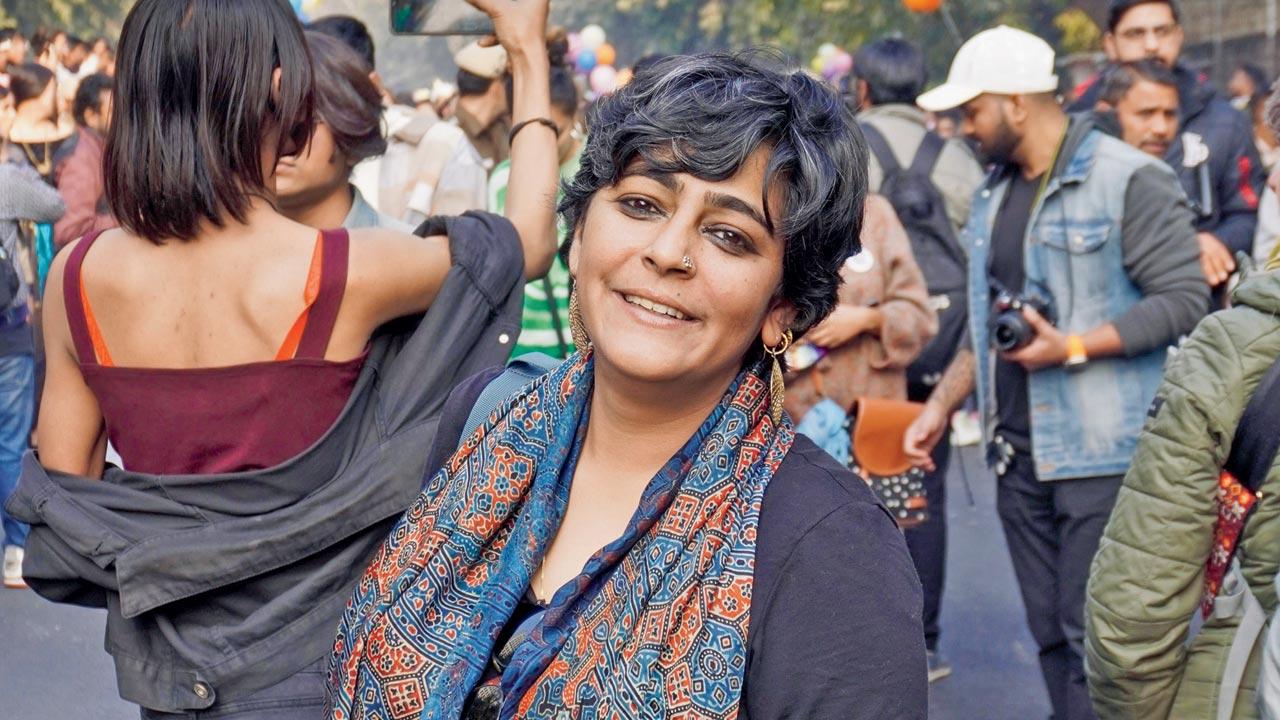 Noor Enayat. Pic Courtesy/Parom Mukherjee
Noor Enayat. Pic Courtesy/Parom Mukherjee
“Privilege is invisible to those who have it. More marginal, more at risk of discrimination, in employment and every other walk of life,” is how Rie Raut, 24, a gender non-binary trans femme from Pune, weighs in. Same-sex marriage is elitist, argues Raut, who belongs to a Bahujan family, and believes that the call for marriage equality is being championed by the Savarna or upper caste members among India’s cisgender gay and lesbian community. “I am not concerned whether I can get married; can I be eligible for a scholarship... that bothers me.”
Raut is one of the young activists fighting for fair representation and lobbying for what is called horizontal reservation; it opposes the common categorisation of transgender persons among the OBCs (Other Backward Caste).
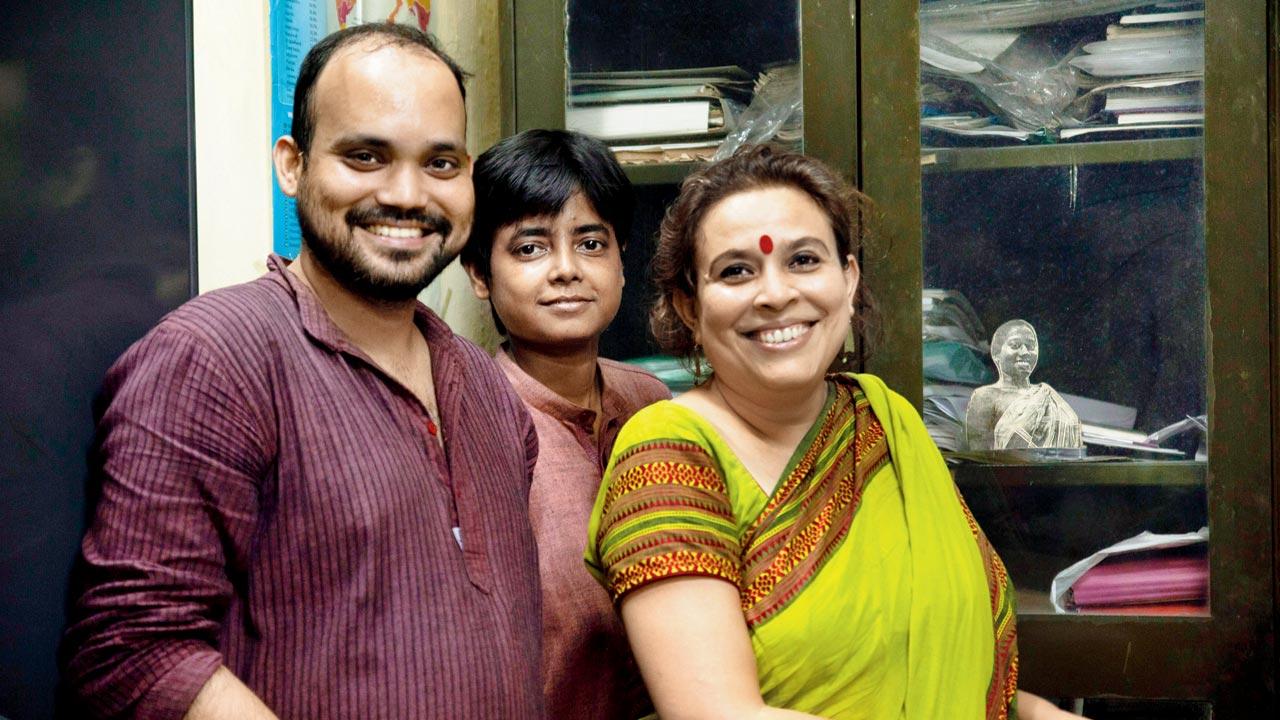
Activist Gourab Ghosh, filmmaker Debalina Majumder and Professor Paromita Chakravarti in a still from Gay India Matrimony
On the other side sit the likes of Minakshi Sanyal, better known as Malobika. She is one of 20 petitioners in the marriage equality rights case. Sanyal has been an active player in India’s LGBTQiA+ rights movement for 24 years. “We are looking at marriage equality through the feminist lens, and canvassing before the court a new imagination of marriage and relationships that places at its foundation, love, care and respect that does not always come from natal families. It can also come from chosen families. Within the queer community, familial violence is a harsh reality, and it won’t magically go away if we are legally allowed to marry.”
Sanyal co-founded Sappho and Sappho for Equality, a rights/justice-based NGO in Kolkata to fight homophobia, discrimination and violence, with six other members including her partner, Akanksha, 58. In November, the devoted pair will celebrate 30 years of togetherness. During their 25th fête, Sanyal recalls celebrating the occasion with Sappho friends and family, but admits to not having taken a single photograph with her partner. “[If the court rules in favour of marriage rights] I won’t get married. And I can say this because I have tremendous privilege. At age 60, I would probably not [marry]. It is a complicated proposition.”
And yet, Sanyal admits to not being critical of the institution. “I am not against same-sex marriage; it gives practical incentives like tax benefits. It is like that buy-one-get-1000-things-free ticket. Our argument is that those [queer singles or couples] who don’t want to get married should also be afforded the same legal rights [as those who marry].”
Noor Enayat, 38, is “anti-marriage”—both for the queers and the straight. “As a single, queer female, I should have the choice to marry or not, and this choice should not dictate whether I am accorded legal rights including intestacy or healthcare benefits. That’s true parity,” reasons Enayat, who is VP & Lead at PCA-MSL. It does not matter where you are on the sexuality spectrum, Enayat argues, “the institution [marriage] effectively unveils gender politics of who is the man in the relationship.” She thinks new ways of living and loving require new institutions.
When Kolkata-based filmmaker Debalina Majumder began work on Gay India Matrimony a decade ago, the LGBTQiA+ landscape looked very different. In December 2013, the Supreme Court had reinstated Section 377 of the Indian Penal Code that made same-sex conduct between two consenting adults a criminal offence.
Majumder, 50, a queer feminist, manages to present a compelling depiction of queer individuals in pursuit of gay marriage rights in a narrative that moves from celebration to critique, covering the social, biological, economic and political implications. The film probes what it means to desire same-sex marriage when the state, law and society does not permit it. Shot between 2013 and 2018, the film features a scene where Paromita Chakravarti, professor at Jadavpur University, questions the pre-established structure of marriage itself: Is there no other way to claim our space and narratives outside the outdated cookie-cutter model?
Gay India Matrimony released in 2019 with an A certificate, a year after the Supreme Court decriminalised homosexuality in a landmark judgment. Barely a month before the SC commenced hearing petitions seeking to legalise same-sex marriage, a screening of the film was cancelled at Ravenshaw University in Cuttack, because “its theme was against Indian culture”. “Even if the law changes, society does not. There are no black and white answers,” says Majumder.
Rupa Sengupta, 35, admits to having long been dismissive of marriage, and its associated roles that she thinks carry negative historical baggage, especially for women. But this changed when she met Anuja Parikh, 37. The couple wed in an intimate “DIY” ceremony in Mumbai last December with friends and family in attendance. While same-sex marriage is not legally recognised in India, there is no statutory or constitutional provision restricting it either. “We wanted to do a wedding ceremony to let our families, friends and neighbours know that we are more than ‘friends’. We did it in our own novel way and dropped some antiquated rituals that favour patriarchal traditions like kanyadan and saat pheras. Sartorially too, we decided to take turns to dress up in what is considered feminine and masculine fashion,” Sengupta explains.
“We have been denied a personal life,” says Parikh, who runs The Modern Tail, an organic pet care brand with Sengupta. “We consider ourselves equal partners in the relationship and would like legal rights and protection that go beyond the ceremonious side. If we are allowed to have a child but only one of us can be the legal guardian, it puts an immense burden on one person and creates an imbalance in the relationship.”
The two have been following the same-sex marriage hearings and with every argument presented by the lawyers representing the petitioners, they feel optimistic albeit cautiously. One way or the other, marriage still seems to constitute a profound idea, as Sengupta says: “I do want to see what life is like from the other side.”
 Subscribe today by clicking the link and stay updated with the latest news!" Click here!
Subscribe today by clicking the link and stay updated with the latest news!" Click here!








